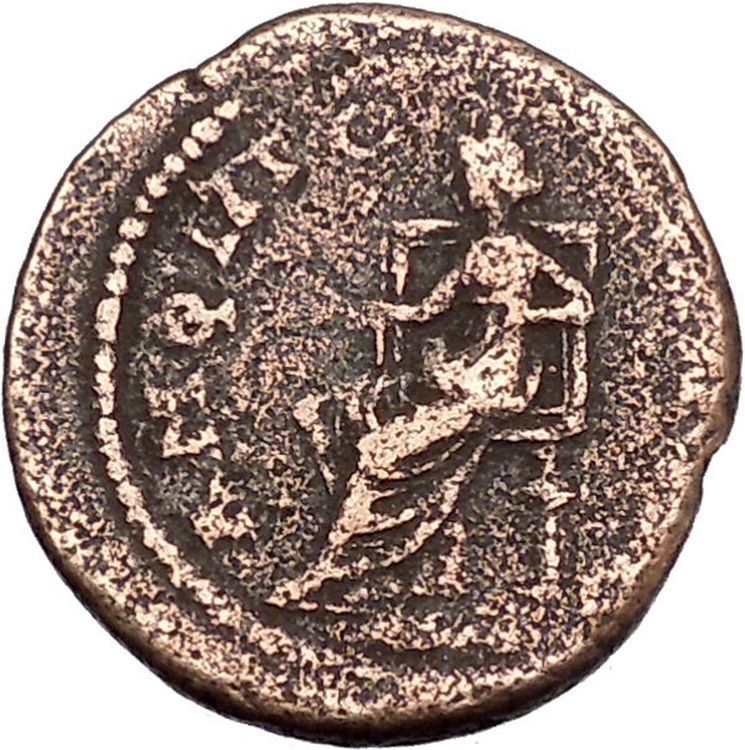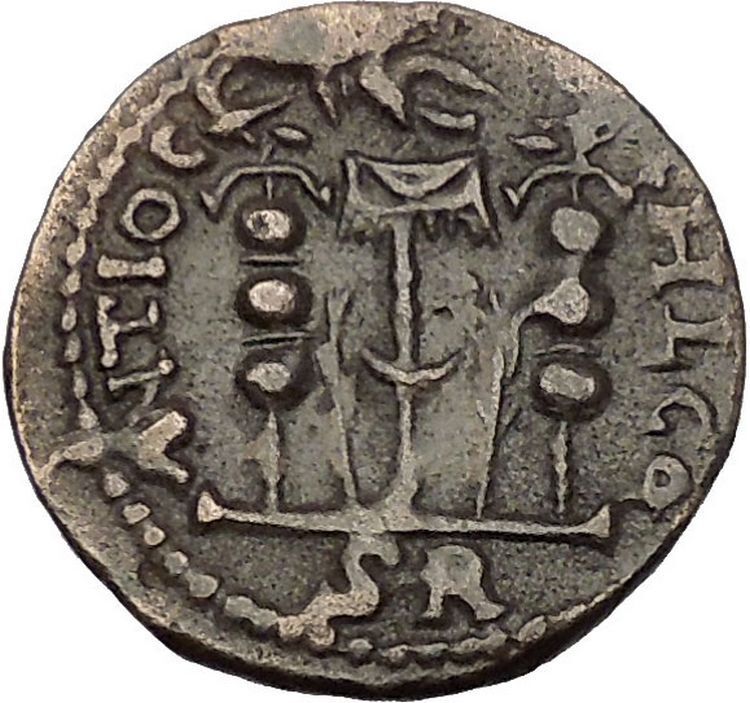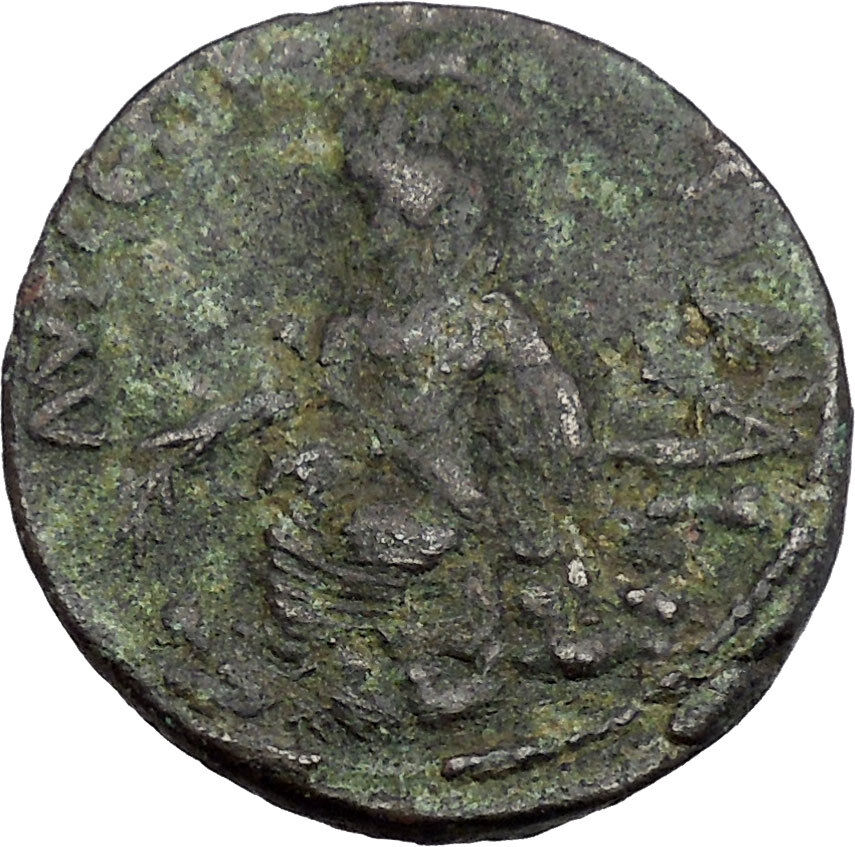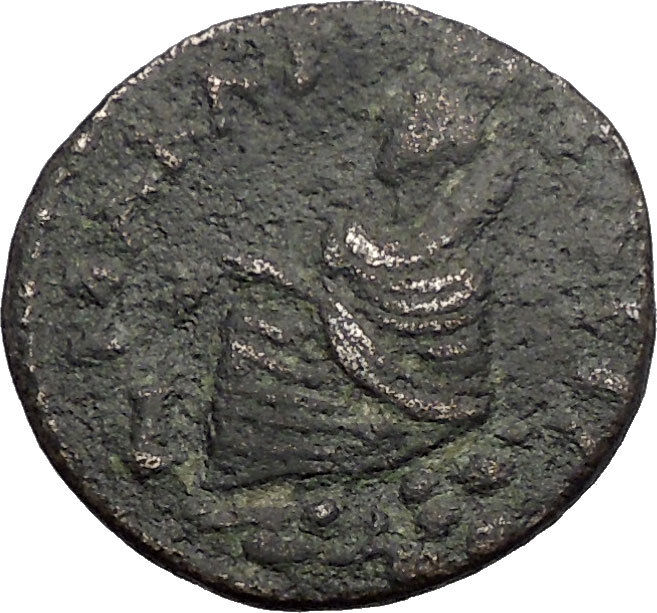|
Antoninus Pius –
Roman Emperor: 138-161 A.D.
Bronze 21mm (8.82 grams) city of Tyana in Cappadocia, Struck 156/157 A.D.
Reference: Sear GIC 1490; B.M.C.20.97,6
AVTOK. ANTWNЄINOC CЄBA, Laureate head right.
TYANЄWN T.Π.T. IЄP. ACY. AYT., City-goddess
(Tyche) enthroned left, holding corn-ears and grapes, river-god swimmint at her
feet; in field, ЄT-ΘI (= regnal year 19 = 156/157
A.D.).
You are bidding on the exact
item pictured, provided with a Certificate of Authenticity and Lifetime
Guarantee of Authenticity.
Tyche (Greek for luck; the Roman equivalent was
Fortuna
) was the presiding
tutelary deity
that governed the fortune and
prosperity of a city, its destiny. Increasingly during the Hellenistic period,
cities had their own specific iconic version of Tyche, wearing a
mural crown
(a crown like the walls of the
city).

The
Greek historian Polybius
believed that when no cause can be
discovered to events such as floods, droughts, frosts or even in politics, then
the cause of these events may be fairly attributed to Tyche.
Stylianos Spyridakis concisely expressed Tyche’s appeal in a
Hellenistic world of arbitrary violence and unmeaning reverses: “In the
turbulent years of the
Epigoni of Alexander
, an awareness of the
instability of human affairs led people to believe that Tyche, the blind
mistress of Fortune, governed mankind with an inconstancy which explained the
vicissitudes of the time.”
In literature, she might be given various genealogies, as a daughter of
Hermes
and
Aphrodite
, or considered as one of the
Oceanids
, daughters of
Oceanus
and
Tethys
, or of
Zeus. She was connected with
Nemesis
and
Agathos Daimon
(“good spirit”).
She was uniquely venerated at
Itanos
in Crete, as Tyche Protogeneia,
linked with the Athenian
Protogeneia
(“firstborn”), daughter of
Erechtheus
, whose self-sacrifice saved the
city.
She had temples at
Caesarea Maritima
,
Antioch
,
Alexandria
and
Constantinople
. In
Alexandria
the Tychaeon, the temple of
Tyche, was described by
Libanius
as one of the most magnificent of the
entire Hellenistic world.
Tyche appears on many
coins
of the Hellenistic period in the three
centuries before the Christian era, especially from cities in the Aegean.
Unpredictable turns of fortune drive the complicated plotlines of
Hellenistic romances
, such as
Leucippe and Clitophon
or
Daphnis and Chloe
. She experienced a
resurgence in another era of uneasy change, the final days of publicly
sanctioned
Paganism
, between the late-fourth-century
emperors
Julian
and
Theodosius I
who definitively closed the
temples. The effectiveness of her capricious power even achieved respectability
in philosophical circles during that generation, though among poets it was a
commonplace to revile her for a fickle harlot.
In medieval art
, she was depicted as carrying a
cornucopia
, an
emblematic
ship’s rudder, and the
wheel of fortune
, or she may stand on the
wheel, presiding over the entire circle of fate.
The constellation of
Virgo
is sometimes identified as the heavenly
figure of Tyche, as well as other goddesses such as
Demeter
and
Astraea
.
Tyana or Tyanna
(Ancient Greek:
Τύανα,
Hittite
Tuwanuwa) was an ancient city in
the Anatolian
region of
Cappadocia
, in modern
Kemerhisar
,
Niğde Province
,
Central Anatolia
,
Turkey
. It was the capital of a
Luwian
-speaking
Neo-Hittite
kingdom in the 1st millennium BC.
History
Tyana is the city referred to in
Hittite
archives as Tuwanuwa. During the
Hittite Empire period in mid 2nd millennium, Tuwanuwa was among the principal
settlements of the region along with Hupisna, Landa, Sahasara, Huwassana and
Kuniyawannni. This south-central Anatolian region was referred to as the Lower
Land in Hittite sources and its population was mainly
Luwian
speakers. Following the collapse of the
Hittite Empire, Tuwanuwa/Tuwana was a major city of the independent Neo-Hittite
kingdoms. It is not certain whether or not it was initially subject to the
Tabal
kingdom to its north, but certainly by
the late 8th century BC it was an independent kingdom under a ruler named
Warpalawa
(in Assyrian sources Urballa). He
figures in several hieroglyphic
Luwian inscriptions
found in the region,
including a monumental rock carving in
Ivriz
. Warpalawa is also mentioned in Assyrian
texts, under the name Urballa, first in a list of tributees of Assyrian king
Tiglath Pileser III
and later in a letter of
Sargon II
. Warpalawa was probably succeeded by
his son Muwaharani whose name appears in another monument found in
Niğde
.
Greek and Roman
periods
In Greek legend, the city was first called Thoana because Thoas, a
Thracian
king, was its founder (Arrian,
Periplus Ponti Euxini, vi); it was in
Cappadocia
, at the foot of the
Taurus Mountains
and near the Cilician Gates (Strabo,
XII, 537; XIII, 587).
Xenophon
mentions it in his book
Anabasis
, under the name of Dana, as
a large and prosperous city. The surrounding plain was known after it as
Tyanitis.
It is the reputed birthplace of the celebrated philosopher (and reputed
saint, god, or magician)
Apollonius of Tyana
in the first century AD.
Ovid (Metamorphoses
VIII) places the tale of
Baucis and Philemon
in the vicinity.
According to Strabo the city was known also as “Eusebeia at the Taurus”.
Under
Roman Emperor
Caracalla
, the city became Antoniana colonia
Tyana. After having sided with Queen
Zenobia
of
Palmyra
, it was captured by
Aurelian
in 272, who would not allow his
soldiers to sack it, allegedly because
Apollonius
appeared to him, pleading for its
safety.
Late Roman
and Byzantine periods
In 372, Emperor Valens
split the
province
of Cappadocia in two, and Tyana became
the capital and metropolis of
Cappadocia Secunda
. In
Late Antiquity
, the city was also known as
Christoupolis (Greek:
Χριστούπολις, “city of Christ”).
Following the
Muslim conquests
and the establishment of the
frontier between the
Byzantine Empire
and the
Caliphate
along the
Taurus Mountains
, Tyana became important as a
military base due to its strategic position on the road to
Cilicia
and
Syria
via the
Cilician Gates
, which lie some 30 km to the
south. Consequently, the city was frequently targeted by Muslim raids. The city
was first
sacked
by the
Umayyads
after a long siege in 708, and
remained deserted for some time before being rebuilt. It was then
occupied
by the
Abbasid
caliph
Harun al-Rashid
in 806. Harun began converting
the city into a military base and even erected a
mosque
there, but evacuated it after the
Byzantine emperor
Nikephoros I
bought a peace.
The city was again taken and razed by the Abbasids under
Al-Abbas ibn al-Ma’mun
in 831. Abbas rebuilt
the site three years later as an Abbasid military colony in preparation for
Caliph al-Ma’mun
‘s planned conquest of Byzantium, but
after Ma’mun’s sudden death in August 833 the campaign was abandoned by his
successor
al-Mu’tasim
and the half-rebuilt city was razed
again.
The city fell into decline after 933, as the Arab threat receded. The ruins
of Tyana are at modern
Kemerhisar
, three miles south of
Niğde
; there are remains of a
Roman aqueduct
and of cave cemeteries and
sepulchral grottoes.
Ecclesiastical history
As noted, in 372 Emperor
Valens
created the province of Cappadocia
Secunda, of which Tyana became the metropolis. This aroused a violent
controversy between
Anthimus
, Bishop of Tyana, and St.
Basil of Caesarea
, each of whom wished to have
as many
suffragan
sees as possible. About 640 Tyana had
three, and it was the same in the tenth century (Heinrich
Gelzer, “Ungedruckte … Texte der Notitiae episcopatum”, 538, 554).
Le Quien
(Oriens christianus, I,
395-402) mentions 28 bishops of Tyana, among whom were:
- Eutychius, at Nice in 325
- Anthimus, the rival of St. Basil
- Aetherius, at Constantinople in 381
- Theodore, the friend of
St. John Chrysostom
- Eutherius, the partisan of
Nestorius
, deposed and exiled in 431
- Cyriacus, a
Severian
Monophysite
.
In May 1359, Tyana still had a
metropolitan
(Mikelosich and Müller, “Acta
patriarchatus Constantinopolitani”, I, 505); in 1360 the
metropolitan of Caesarea
secured the
administration of it (op. cit., 537). Thenceforth the see was titular.
Titus Aurelius Fulvus Boionius Arrius Antoninus (19 September 86 – 7
March 161), generally known in English as Antoninus Pius was
Roman emperor
from 138 to 161. He was the fourth of the
Five Good Emperors
 and a member of the and a member of the
Aurelii
. He
did not possess the
sobriquet
“Pius” until after
his accession to the throne. Almost certainly, he earned the name “Pius” because
he compelled the
Senate
to deify his adoptive father
Hadrian
; the
Historia Augusta
, however, suggests that he may have earned the name by
saving senators sentenced to death by Hadrian in his later years.
//
He was the son and only child of
Titus Aurelius Fulvus
,
consul
in 89
whose family came from
Nemausus
(modern Nîmes
)
and was born near
Lanuvium
and his mother was Arria Fadilla. Antoninus’ father and paternal grandfather
died when he was young and he was raised by
Gnaeus Arrius Antoninus
, his maternal grandfather, a man of integrity and
culture and a friend of
Pliny the Younger
. His mother married to Publius Julius Lupus (a man of
consular rank),
Suffect
Consul
in 98, and bore him a daughter called Julia Fadilla.
As a private citizen between 110 and 115, he married Annia Galeria
Faustina the Elder
. They had a very happy marriage. She was the daughter of
consul
Marcus Annius Verus
and
Rupilia
Faustina (a half-sister to Roman Empress
Vibia
Sabina
). Faustina was a beautiful woman, renowned for her wisdom. She spent
her whole life caring for the poor and assisting the most disadvantaged Romans.
Having filled with more than usual success the offices of
quaestor
and praetor
,
he obtained the consulship in 120; he was next appointed by the Emperor
Hadrian
as
one of the four
proconsuls
to administer
Italia
, then greatly increased his reputation by his conduct as
proconsul
of
Asia
. He acquired much favor with the Emperor Hadrian, who adopted him as
his son and successor on 25 February, 138, after the death of his first adopted
son Lucius Aelius
, on the condition that Antoninus would in turn adopt Marcus
Annius Verus, the son of his wife’s brother, and Lucius, son of Aelius Verus,
who afterwards became the emperors
Marcus Aurelius
and
Lucius
Verus
(colleague of Marcus Aurelius).
Emperor
On his accession, Antoninus’ name became “Imperator Caesar Titus Aelius
Hadrianus Antoninus Augustus Pontifex Maximus”. One of his first acts as Emperor
was to persuade the
Senate
to grant divine honours to Hadrian, which they had at first refused; his efforts
to persuade the Senate to grant these honours is the most likely reason given
for his title of Pius (dutiful in affection; compare
pietas
). Two other reasons for this title are that he would support his
aged father-in-law with his hand at Senate meetings, and that he had saved those
men that Hadrian, during his period of ill-health, had condemned to death. He
built temples, theaters, and mausoleums, promoted the arts and sciences, and
bestowed honours and financial rewards upon the teachers of
rhetoric
and philosophy
.
In marked contrast to his predecessors
Trajan
and
Hadrian
,
Antoninus was not a military man. One modern scholar has written “It is almost
certain not only that at no time in his life did he ever see, let alone command,
a Roman army, but that, throughout the twenty-three years of his reign, he never
went within five hundred miles of a legion”.[2]
His reign was the most peaceful in the entire history of the
Principate
;
while there were several military disturbances throughout the Empire in his
time, in Mauretania
,
Iudaea
, and amongst the
Brigantes
in Britannia
, none of them are considered serious. The unrest in Britannia is
believed to have led to the construction of the
Antonine Wall
from the
Firth of Forth
to the
Firth of Clyde
, although it was soon abandoned. He was virtually unique
among emperors in that he dealt with these crises without leaving Italy once
during his reign, but instead dealt with provincial matters of war and peace
through their governors or through imperial letters to the cities such as
Ephesus (of which some were publicly displayed). This style of government was
highly praised by his contemporaries and by later generations.
Of the public transactions of this period we have scant information, but, to
judge by what we possess, those twenty-two years were not remarkably eventful in
comparison to those before and after his; the surviving evidence is not complete
enough to determine whether we should interpret, with older scholars, that he
wisely curtailed the activities of the Roman Empire to a careful minimum, or
perhaps that he was uninterested in events away from Rome and
Italy
and his
inaction contributed to the pressing troubles that faced not only Marcus
Aurelius but also the emperors of the third century. German historian Ernst
Kornemann has had it in his Römische Geschichte [2 vols., ed. by H. Bengtson,
Stuttgart 1954] that the reign of Antoninus comprised “a succession of grossly
wasted opportunities,” given the upheavals that were to come. There is more to
this argument, given that the Parthians in the East were themselves soon to make
no small amount of mischief after Antoninus’ passing. Kornemann’s brief is that
Antoninus might have waged preventive wars to head off these outsiders.
Scholars place Antoninus Pius as the leading candidate for fulfilling the
role as a friend of Rabbi
Judah
the Prince
. According to the
Talmud
(Avodah
Zarah 10a-b), Rabbi Judah was very wealthy and greatly revered in Rome. He had a
close friendship with “Antoninus”, possibly Antoninus Pius,
who would consult Rabbi Judah on various worldly and spiritual matters.
After the longest reign since Augustus (surpassing
Tiberius
by
a couple of months), Antoninus died of fever at
Lorium
in
Etruria
,
about twelve miles (19 km) from Rome, on 7 March 161, giving the keynote to his
life in the last word that he uttered when the
tribune
of
the night-watch came to ask the password—”aequanimitas” (equanimity). His body
was placed in
Hadrian’s mausoleum
, a
column
was dedicated to him on the
Campus Martius
, and the
temple
he had built in the Forum in 141 to his deified wife Faustina was
rededicated to the deified Faustina and the deified Antoninus.
Historiography
The only account of his life handed down to us is that of the
Augustan History
, an unreliable and mostly fabricated work. Antoninus is
unique among Roman emperors in that he has no other biographies. Historians have
therefore turned to public records for what details we know.
In
later scholarship
Antoninus in many ways was the ideal of the landed gentleman praised not only
by ancient Romans, but also by later scholars of classical history, such as
Edward Gibbon
or the author of the article on Antoninus Pius in the ninth
edition of the
Encyclopedia Britannicaca:
A few months afterwards, on Hadrian’s death, he was enthusiastically
welcomed to the throne by the Roman people, who, for once, were not
disappointed in their anticipation of a happy reign. For Antoninus came
to his new office with simple tastes, kindly disposition, extensive
experience, a well-trained intelligence and the sincerest desire for the
welfare of his subjects. Instead of plundering to support his
prodigality, he emptied his private treasury to assist distressed
provinces and cities, and everywhere exercised rigid economy (hence the
nickname κυμινοπριστης “cummin-splitter”). Instead of exaggerating into
treason whatever was susceptible of unfavorable interpretation, he
spurned the very conspiracies that were formed against him into
opportunities for demonstrating his clemency. Instead of stirring up
persecution against the Christians, he extended to them the strong hand
of his protection throughout the empire. Rather than give occasion to
that oppression which he regarded as inseparable from an emperor’s
progress through his dominions, he was content to spend all the years of
his reign in Rome, or its neighborhood.
|






 and a member of the
and a member of the


